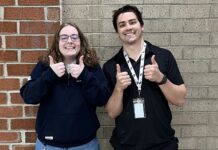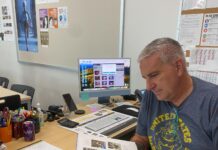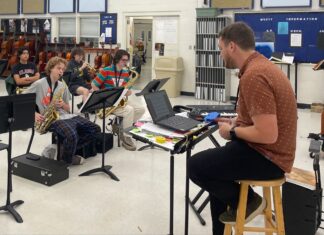Senior Jeneice Mason-Carter worked diligently for months to create Let’s Talk About Race, a documentary she presented at the “Lift Every Voice: A Celebration of Black History and Future” assembly on February 15.
Mason-Carter reached out to English teacher Michael Irwin about creating a film for the assembly. She made a similar video for a project last year in Emily Flores’s Honors Sociology and Psychology Seminar course, where students asked people a series of questions on race, age and more.
“When Mr. Irwin told me about the assembly, I came up with the idea that the project I had previously done kind of fit in with the theme,” Mason-Carter said.
Mason-Carter said she was not sure where to start, so she asked her former sociology teacher for help. Flores advised her to start with the question “What’s your race?” and build from there.
Over six weeks, Mason-Carter asked diverse students a range of questions, such as “Have you ever noticed if you have been treated differently based on your race?” and “What does it mean to be black in the 21st century?”
Sophomore Tia Chawla is among the 40 Chapel Hill students who spoke in the video. She mentioned the significance of Mason-Carter’s inclusion of diverse students.
“With race, everybody has their own story, and I think it’s so important that she included different people’s experiences. Depending on what race you are, there’s different struggles that come with it and there’s different advantages, and it’s important to bring those to light,” Chawla said.
Irwin was inspired by Mason-Carter’s dedication to creating the video.
“I’ve never seen a student compile so much quality footage in such a short time frame—it’s pretty impressive that she organized so many diverse voices into the film,” Irwin said.
A ten-minute introduction clip of her documentary was shown at the assembly, and the full, hour-long video can be viewed in multiple parts on YouTube.
Senior Solomon Donaldson, one of the students who answered questions in the video, was impressed with the final product.
“I think it’s important for people to be heard. I had something to offer, so I did that,” Donaldson said.
Donaldson noted that there is still much to be done at Chapel Hill.
“We like to think that Chapel Hill is a really liberal area and that we’re a really accepting area, but, if you look at it, we’re still pretty segregated, so I think I would like to see a little bit more mixing going on,” he said. “We can’t just stay to ourselves and expect to magically know what everybody is going through and magically understand everyone’s experiences.”
Mason-Carter thinks the video meets the goals she set.
“The ultimate goal of the documentary was to spark conversation, which it has because, ever since the assembly, I’ve had many great open conversations that concern race,” Mason-Carter said.
She continued to emphasize the need for dialogue in order for action to take place.
“I think the video is also there to educate the teachers and to just get people to know that race doesn’t have to be this negative thing,” she said. “If we can’t have open conversations and talk about [race], then nothing is ever going to change.”
Irwin stressed the importance of keeping conversations going about race and praised Mason-Carter’s contribution.
“This school needs to highlight student voices even more in equity-based conversations,” he said, “and we owe a lot to Jeneice for pushing us along.”











